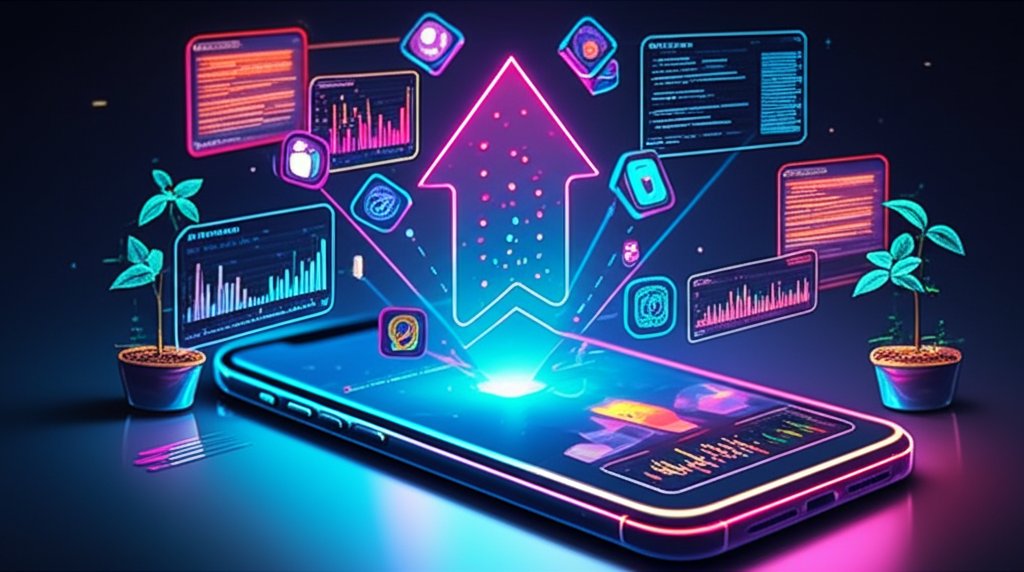The future of fintech isn’t just about innovative financial products; it’s about how those products are delivered to users. That’s where a top rated mobile app development company becomes indispensable, turning complex financial concepts into intuitive, user-friendly mobile experiences that will drive adoption and engagement in 2025.
At a glance:
- Learn why choosing the right mobile app development partner is crucial for fintech success.
- Understand the key skills and experience to look for in a top-rated fintech app developer.
- Discover the different engagement models for mobile app development and which one suits your needs.
- Explore the critical factors that ensures your fintech app meets the stringent requirements for security, compliance, and user experience
- Get actionable insights on cost optimization and long-term maintenance strategies.
Why a Stellar Mobile App is Non-Negotiable for Fintech Success
In the rapidly evolving fintech landscape, a great idea simply isn’t enough. Users expect seamless, secure, and engaging mobile experiences. A clunky, unreliable app will quickly be abandoned, regardless of the brilliance of the underlying financial service. Think about it: most users are interacting with your fintech product entirely through their phones. Their perception of your brand, your security, and your competence is directly tied to the quality of that app.
Consider the difference between a traditional bank app and a modern neobank. The traditional app might be functional, but often feels outdated and cumbersome. A neobank app, built from the ground up with mobile in mind, offers a streamlined, intuitive experience that encourages frequent use and builds trust. A top rated mobile app development company understands this nuance and can bridge the gap between financial expertise and user-centric design.
What to Expect From The Top Fintech Apps
Top fintech apps must be dynamic, highly performative applications that run seamlessly on all types of mobile devices. Here are some of the top fintech apps in 2025:
- Chime: A leading neobank offering fee-free services and automatic savings features, enhanced by AI-driven financial coaching to improve credit scores and avoid debt.
- N26: A European digital bank known for multi-currency accounts and real-time spend alerts, now featuring crypto wallets and eco-spending insights.
- Monzo: A smart banking app offering spending notifications, bill splitting, and goal-based savings, with an AI budgeting advisor that anticipates shortfalls and suggests saving strategies.
- Lili: An app specifically designed for freelancers, combining banking, expense tracking, and tax tools, with automated tax filing and smart project budgeting capabilities.
Key Skills: What To Look for in a Top Rated Mobile App Development Company

Not all app developers are created equal. Fintech demands a specific skill set and experience base. Here’s what to prioritize:
- Deep Fintech Knowledge: Experience building apps for banking, payments, lending, investment, or insurance. Someone who understands the regulatory landscape, security protocols, and specific user needs within finance.
- Mobile-First Expertise: Profound proficiency in iOS and Android development, including native and cross-platform technologies, and a deep understanding of mobile UI/UX best practices.
- Security Prowess: Expertise in mobile security best practices, including secure coding, data encryption, authentication, and authorization. This is non-negotiable in the fintech world.
- API Integration Expertise: The ability to seamlessly integrate with third-party APIs for banking, payments, data aggregation, and other essential services.
- Agile Development: A flexible and iterative approach to development that allows for rapid prototyping, testing, and adaptation to changing requirements.
- Compliance Acumen: Understanding of and experience building apps that comply with relevant regulations, such as KYC/AML, GDPR, and PCI DSS.
- UI/UX Design Focused on Finance: Fintech apps need to be intuitive and user-friendly, even when dealing with complex financial concepts. This requires a design team with experience creating engaging and trustworthy interfaces.
Choosing The Right Engagement Model
How you engage with your development partner can significantly impact the project’s success. Several engagement models exist, each with its own pros and cons:
- Fixed Price: Clearly defined scope and fixed price. Best for projects with well-defined requirements and minimal anticipated changes. Caveat: Can be inflexible if requirements evolve.
- Time & Materials: Pay for the actual time and resources spent on the project. Best for projects with evolving requirements and a need for flexibility. Caveat: Requires careful management to control costs.
- Dedicated Team: A team of developers dedicated solely to your project. Best for long-term projects with ongoing development and maintenance needs. Caveat: Higher upfront cost but can be cost-effective in the long run.
- Staff Augmentation: Supplement your existing team with additional developers. Best for filling specific skill gaps or scaling your team quickly. Caveat: Requires strong internal management to integrate augmented staff effectively.
Decision Tree:
- Are your requirements clearly defined and unlikely to change?
- Yes: Consider Fixed Price.
- No: Go to question 2.
- Do you need maximum flexibility and control over the development process?
- Yes: Consider Time & Materials.
- No: Go to question 3.
- Do you have a long-term project with ongoing development and maintenance needs?
- Yes: Consider Dedicated Team.
- No: Consider Staff Augmentation.
Security, Compliance, and User Experience: The Holy Trinity of Fintech App Development
Building a successful fintech app requires balancing three critical factors:
- Security: Fintech apps handle sensitive financial data, making security paramount. Implement robust security measures at every stage of development, including:
- Data Encryption: Protect data in transit and at rest using strong encryption algorithms.
- Secure Authentication: Implement multi-factor authentication and biometric login for enhanced security.
- Regular Security Audits: Conduct regular security audits and penetration testing to identify and address vulnerabilities.
- Compliance: Fintech is a heavily regulated industry. Ensure your app complies with all relevant regulations, including:
- KYC/AML: Implement Know Your Customer (KYC) and Anti-Money Laundering (AML) procedures to prevent fraud and money laundering.
- GDPR: Comply with the General Data Protection Regulation (GDPR) to protect user data privacy.
- PCI DSS: If your app processes credit card payments, comply with the Payment Card Industry Data Security Standard (PCI DSS).
- User Experience: A seamless and intuitive user experience is essential for driving adoption and engagement. Focus on:
- Simple Navigation: Make it easy for users to navigate the app and find what they need.
- Clear and Concise Language: Use clear and concise language to explain complex financial concepts.
- Personalization: Personalize the user experience based on individual preferences and financial goals.
Real-World Example: Successfully Navigating Compliance

A rising fintech startup in the digital lending space needed to build an app that complied with both US and EU regulations. They partnered with a top rated mobile app development company with a proven track record in fintech compliance. The development team integrated a KYC/AML module to verify user identities and prevent fraud, ensured GDPR compliance by implementing robust data privacy measures, and built the app with secure coding practices to protect sensitive financial data. The result was a compliant and secure app that gained user trust and facilitated rapid growth.
Optimizing Costs and Long-Term Maintenance
Developing a fintech app can be a significant investment. Here are some tips for optimizing costs and ensuring long-term maintenance:
- Start with an MVP: Develop a Minimum Viable Product (MVP) with core features to validate your business idea and gather user feedback before investing in full-scale development.
- Choose the Right Technology Stack: Select a technology stack that is cost-effective, scalable, and well-supported.
- Automate Testing: Automate testing to reduce manual testing efforts and improve code quality.
- Plan for Maintenance: Budget for ongoing maintenance and updates to ensure your app remains secure, compliant, and compatible with the latest mobile devices.
- Monitoring and Analytics: Implement robust monitoring and analytics to track app performance, identify issues, and gather user insights.
As you can see, having the right approach to security and compliance is a huge key to ongoing success in the fintech space. It’s just one aspect to understanding the big picture of fintech in 2025. Explore leading fintech apps to better understand the evolving landscape.
Quick Answers: FAQs About Fintech App Development
- Q: How much does it cost to develop a fintech app?
- A: The cost varies greatly depending on the complexity of the app, the features included, and the development team’s location. Expect to invest anywhere from $50,000 to $500,000 or more.
- Q: How long does it take to develop a fintech app?
- A: The development timeline can range from 3 months to 12 months or more, depending on the scope and complexity of the project.
- Q: What are the biggest challenges in fintech app development?
- A: Key challenges include security, compliance, user experience, and integrating with legacy financial systems.
- Q: What are the different platform options for developing a fintech app?
- A: Native (iOS and Android), cross-platform (React Native, Flutter), and hybrid approaches are all viable options, each with its own trade-offs.
- Q: Why not just use an offshore company with low rates?
*A: The lowest price is not the best value. Top rated mobile app development companies balance both cost and quality. A company with deep domain expertise in the unique compliance, security, and fraud problems of fintech will produce a better product, even though this is not always the cheapest option.
Your Next Steps: Building a Fintech Powerhouse
Choosing the right top rated mobile app development company isn’t just about finding someone who can write code; it’s about partnering with a team that understands the nuances of the fintech industry, prioritizes security and compliance, and can deliver a user experience that delights customers. By focusing on these key areas, you can position your fintech app for success in the increasingly competitive market of 2025 and beyond.
- How To Close Apps On Phone To Save Battery And Boost Speed - February 6, 2026
- Turn Off Apps in Background Android for Better Performance - February 5, 2026
- Disable Background Apps Android to Boost Battery and Performance - February 4, 2026










